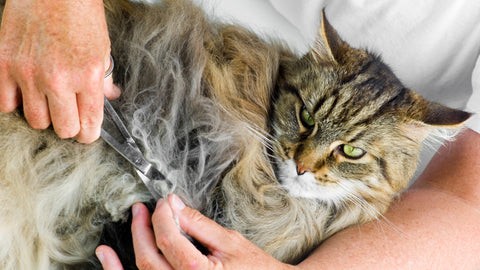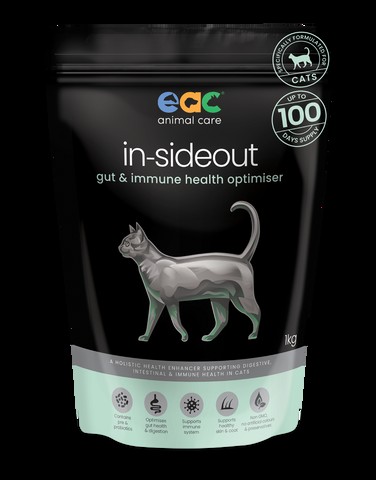Does your feline companion emanate an unpleasant, fecal odor? You’re not alone. Many cat owners encounter this issue. This article, brought to you by WHY.EDU.VN, explores the common reasons why your cat might smell like poop, offering practical solutions and preventative measures. From litter box hygiene to dietary adjustments and potential medical concerns, we’ll cover everything you need to know to keep your kitty smelling fresh and clean. Discover effective odor control strategies and learn about the importance of feline hygiene for your pet’s well-being.
1. Unveiling the Odor: Common Reasons Why Your Cat Smells Like Poop
Several factors can contribute to a cat smelling like poop. Identifying the root cause is crucial for effective resolution. Here are some of the most common culprits:
1.1. The Litter Box Factor: Dirty or Inadequate Litter Boxes
An unclean litter box is a primary reason for a poop-like odor. When the litter box is full of feces and urine, your cat is constantly exposed to these waste products. This can lead to the odor clinging to their fur, especially if they are long-haired. Furthermore, a dirty litter box harbors bacteria, contributing to unpleasant smells and potential health risks.
- Frequency of Scooping: Ideally, scoop the litter box at least once daily, or even twice if you have multiple cats.
- Complete Litter Change: Empty and thoroughly clean the litter box weekly, replacing all the litter with fresh, clean litter.
- Litter Box Location: Place the litter box in a well-ventilated area to help dissipate odors.
- Self-Cleaning Litter Boxes: Consider a self-cleaning litter box for convenience, particularly if you have a busy schedule.
- Number of litter boxes: Make sure you have one more litter box than you do cats, each on a different level of the home.
1.2. Litter Quality Matters: The Impact of Low-Quality Cat Litter
The type of cat litter you use significantly affects odor control. Low-quality litters often lack the absorbency needed to effectively trap urine and feces, leading to lingering odors. These litters may also produce dust, which can irritate your cat’s respiratory system and contribute to poor hygiene.
| Litter Type | Absorbency | Odor Control | Dust Level | Cost |
|---|---|---|---|---|
| Clay Litter | Low | Fair | High | Low |
| Clumping Litter | High | Good | Medium | Medium |
| Crystal Litter | Very High | Excellent | Low | High |
| Wood Pellet Litter | Medium | Good | Low | Medium |


1.3. Anal Gland Issues: When Secretions Go Wrong
Cats possess two anal glands located on either side of their anus. These glands secrete a pungent, oily fluid used for marking territory and communication. However, these glands can become impacted, infected, or abscessed, resulting in a foul odor often described as fishy or poop-like.
- Signs of Anal Gland Problems: Scooting, excessive licking of the anal area, straining during defecation, swelling or redness around the anus.
- Professional Expression: Do not attempt to express your cat’s anal glands yourself, as improper technique can cause injury. Consult a veterinarian or professional groomer for safe and effective anal gland expression.
- Dietary Considerations: A high-fiber diet can help promote regular bowel movements, which can aid in the natural emptying of the anal glands.
1.4. Digestive Troubles: Linking Gut Health to Odor
Digestive issues can significantly impact a cat’s odor. When a cat’s digestive system is not functioning properly, it can lead to loose stools, flatulence, and undigested food particles in the feces, all of which contribute to unpleasant smells.
- Common Digestive Issues: Food allergies, inflammatory bowel disease (IBD), parasites, bacterial infections, and enzyme deficiencies.
- Signs of Digestive Problems: Diarrhea, vomiting, constipation, loss of appetite, weight loss, and abdominal pain.
- Dietary Management: Consult your veterinarian about a diet tailored to your cat’s specific digestive needs. This may involve a hypoallergenic diet, a high-fiber diet, or a diet with easily digestible ingredients.
- Probiotics and Prebiotics: These supplements can help promote a healthy gut microbiome, improving digestion and reducing odor.
1.5. Diet and Digestion: The Food-Odor Connection
A cat’s diet directly impacts the smell of their waste. Poor-quality cat food often contains fillers, artificial ingredients, and low-quality protein sources that can be difficult for cats to digest. This can lead to digestive upset and contribute to a foul odor.
- High-Quality Cat Food: Choose cat food that lists a specific meat source (e.g., chicken, salmon) as the first ingredient.
- Avoid Fillers: Avoid foods containing excessive amounts of corn, wheat, soy, and artificial additives.
- Gradual Food Transitions: When changing your cat’s food, do so gradually over a period of 7-10 days to minimize digestive upset.
1.6. Matted Fur: A Breeding Ground for Odor
Matted fur is a common problem, especially in long-haired cats. When fur becomes tangled and matted, it can trap dirt, feces, and other debris, creating an ideal environment for bacteria and odor-causing microorganisms.
- Regular Grooming: Brush your cat regularly to prevent mats from forming. The frequency of brushing will depend on your cat’s fur length and coat type.
- Professional Grooming: If your cat has severe matting, consult a professional groomer for safe and effective removal.
- Bathing: Regular bathing can help remove dirt and debris from your cat’s coat. However, avoid over-bathing, as this can strip the natural oils from their skin.
1.7. Dirty Rear End: Hygiene Challenges for Cats
Sometimes, the cause of the poop smell is simply a dirty rear end. This can occur if your cat has diarrhea or is unable to groom themselves properly due to obesity, arthritis, or other health issues.
- Hygiene Assistance: Gently clean your cat’s rear end with a soft, damp cloth or pet wipe.
- Veterinary Consultation: If your cat has frequent diarrhea or difficulty grooming, consult your veterinarian to rule out underlying health problems.
1.8. Age-Related Issues: Arthritis and the Ability to Groom
Arthritis, a common condition in older cats, can cause pain and stiffness, making it difficult for them to groom themselves effectively. This can lead to a build-up of dirt and feces around their rear end, resulting in a poop-like odor.
- Joint Supplements: Consider supplementing your cat’s diet with joint supplements containing glucosamine and chondroitin to help reduce pain and inflammation.
- Pain Management: Consult your veterinarian about pain management options for your arthritic cat.
- Assisted Grooming: Help your cat groom by gently brushing them and cleaning their rear end with a damp cloth.
1.9. Constipation: Impacted Feces and Odor
Constipation, the difficulty or inability to pass stool, can lead to a build-up of feces in the intestines, resulting in a foul odor. Constipation can also make it difficult for your cat to groom themselves properly, further contributing to the problem.
- Signs of Constipation: Straining during defecation, hard or dry stools, infrequent bowel movements, and loss of appetite.
- Dietary Fiber: Increase your cat’s fiber intake by adding canned pumpkin or a fiber supplement to their diet.
- Hydration: Ensure your cat has access to fresh, clean water at all times.
- Veterinary Intervention: If your cat is severely constipated, consult your veterinarian for treatment, which may include enemas or stool softeners.
2. Long-Term Solutions: Maintaining a Clean and Fresh-Smelling Cat
In addition to addressing the immediate cause of the poop smell, there are several long-term strategies you can implement to keep your cat smelling clean and fresh.
2.1. The Power of Pet Supplements: Nutraceutical and Joint Support
Pet supplements can play a vital role in maintaining your cat’s overall health and hygiene.
2.1.1. Nutraceutical Supplements:
Nutraceutical supplements, such as in-sideout Cat Formula from WHY.EDU.VN, can support your cat’s immune and intestinal health, promoting better digestion and reducing flatulence and bad breath.
2.1.2. Joint Supplements:
Joint supplements, such as in-fusion msm, can help alleviate pain and inflammation associated with arthritis, improving mobility and the cat’s ability to keep itself clean.
2.2. Maintaining Optimal Hygiene: Bathing and Grooming Techniques
Regular bathing and grooming are essential for maintaining a clean and fresh-smelling cat.
- Bathing Frequency: Most indoor cats only need to be bathed every few months, or as needed. Over-bathing can dry out their skin.
- Cat-Specific Shampoo: Use a shampoo specifically formulated for cats, as human shampoos can be too harsh.
- Gentle Approach: Make bath time a positive experience by using a gentle approach and offering treats.
- Brushing Benefits: Regular brushing helps remove loose fur, prevent mats, and distribute natural oils, keeping their coat healthy and shiny.
2.3. Environmental Control: Air Purifiers and Odor Eliminators
In addition to addressing the source of the odor, you can also use air purifiers and odor eliminators to help keep your home smelling fresh.
- Air Purifiers: Air purifiers with HEPA filters can help remove dust, allergens, and odors from the air.
- Odor Eliminators: Use odor eliminators specifically designed for pet odors, avoiding harsh chemicals or fragrances that can irritate your cat.
3. Medical Conditions: When to Consult a Veterinarian
While many cases of poop-like odor in cats can be resolved with simple hygiene and dietary adjustments, it’s important to be aware of potential underlying medical conditions. If the odor persists despite your best efforts, or if your cat exhibits other signs of illness, consult your veterinarian.
3.1. Identifying Potential Medical Causes
Several medical conditions can contribute to a poop-like odor in cats, including:
- Anal Gland Disease: Impacted, infected, or abscessed anal glands.
- Inflammatory Bowel Disease (IBD): A chronic inflammatory condition affecting the digestive tract.
- Parasites: Intestinal parasites can cause diarrhea and contribute to odor.
- Kidney Disease: Kidney disease can lead to a build-up of toxins in the body, which can cause a foul odor.
- Diabetes: Diabetes can increase the risk of infections, which can contribute to odor.
3.2. The Importance of Veterinary Diagnosis
A veterinarian can perform a thorough physical examination and run diagnostic tests to determine the underlying cause of the odor and recommend appropriate treatment.
4. Preventing Future Odor Problems: Proactive Measures
Preventing future odor problems requires a proactive approach to your cat’s health and hygiene.
4.1. Maintaining a Clean Living Environment
- Regular Litter Box Maintenance: Scoop the litter box daily and change the litter completely weekly.
- Proper Ventilation: Ensure adequate ventilation in your home to help dissipate odors.
- Cleanliness: Regularly clean your cat’s bedding and toys to prevent the build-up of dirt and bacteria.
4.2. Dietary Considerations and Nutritional Support
- High-Quality Cat Food: Feed your cat a high-quality diet that is appropriate for their age, activity level, and health status.
- Fresh Water: Ensure your cat has access to fresh, clean water at all times.
- Probiotics and Prebiotics: Consider supplementing your cat’s diet with probiotics and prebiotics to support gut health.
4.3. Regular Veterinary Checkups
Regular veterinary checkups are essential for maintaining your cat’s overall health and detecting potential problems early.
- Annual Examinations: Schedule annual checkups with your veterinarian for a thorough physical examination and preventative care.
- Vaccinations and Parasite Control: Keep your cat up-to-date on vaccinations and parasite control to prevent illness and disease.
- Dental Care: Regular dental care is important for preventing dental disease, which can contribute to bad breath.
5. FAQs About Cat Smells: Addressing Common Concerns
Cat owners often have questions about why their cat smells like poop and how to keep their pets smelling clean. Here are answers to some frequently asked questions:
5.1. If a Cat Smells Bad, Should You Bathe It?
While bathing can help remove dirt and odors, over-bathing can strip the natural oils from your cat’s skin, leading to dryness and irritation. Only bathe your cat when necessary, using a shampoo specifically formulated for cats.
5.2. How Can I Prevent My Cat from Smelling Like Poop in the Future?
Preventing a poop smell requires a multi-faceted approach, including regular litter box maintenance, a high-quality diet, regular grooming, and veterinary care.
5.3. My Cat is Old and Smells Like Poop. Is This Normal?
As cats age, arthritis and other health conditions can make grooming difficult. Senior cats may also have a harder time digesting their food properly. If your elderly cat smells like poop, it’s important to pay close attention and seek a solution.
6. Conclusion: A Holistic Approach to Feline Hygiene
Addressing a poop-like odor in cats requires a holistic approach that considers hygiene, diet, environment, and potential medical conditions. By implementing the strategies outlined in this article, you can help your cat stay clean, healthy, and fresh-smelling. Remember to consult your veterinarian if you have any concerns about your cat’s health or hygiene.
At WHY.EDU.VN, we understand the importance of providing accurate and reliable information to pet owners. We encourage you to explore our website for more articles and resources on feline health and well-being.
Do you have questions about your cat’s health or hygiene? Visit why.edu.vn at 101 Curiosity Lane, Answer Town, CA 90210, United States, or contact us via WhatsApp at +1 (213) 555-0101. Our team of experts is here to help you find the answers you need to keep your feline companion happy and healthy.
